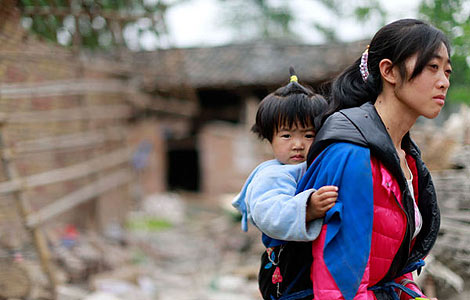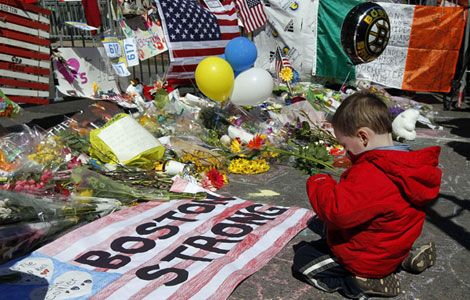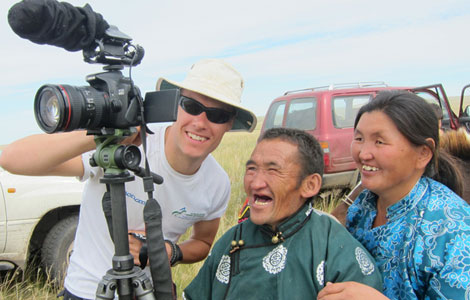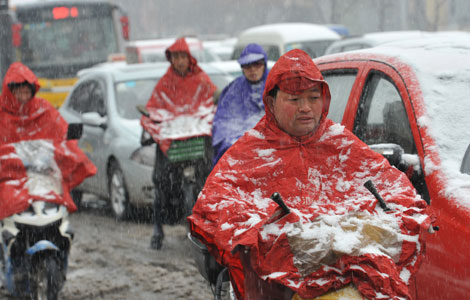Hypocrisy and selective myopia
Updated: 2013-04-22 07:25
By Shan Chu (China Daily)
|
||||||||
US and other Western countries are using double standards on human rights to advance their own political agenda
On April 19, the State Department of the United States released its Annual Country Report on Human Rights Practices. In the report, the US points an accusing finger at over 190 countries, while turning a blind eye to its own human rights malpractices. It is no surprise that China is again the victim of groundless US accusations; they are not even worth refuting. What the US is doing is a clear demonstration that some Western countries are still employing so-called human rights diplomacy, no matter how inaccurate and biased, for their own ends. Besides fabricating distorted human rights reports, they also resort to the naming-and-shaming of developing countries in the UN Human Rights Council and other international arenas, and, under the pretext of promoting and protecting human rights, they meddle in other countries' domestic affairs.
It should be pointed out that there is nothing wrong with promoting respect for human rights as embodied in the Universal Declaration of Human Rights and other international instruments. The problem is some Western countries are politicizing human rights issues and conducting human rights policy in an unjustified and selective manner.
First, they use human rights as a political tool to vilify other countries and advance their own political agenda. Western countries can achieve multiple aims by continuously promoting their self-styled human rights diplomacy. One is spreading Western values, affecting the mindsets of others and depicting themselves as human rights watchdogs. Another is tarnishing the image of a target country by continuously criticizing its human rights record and fabricating negative stories about the country, seeking to undermine the credibility of the target country's government. A typical example is the Dulles' Plan, which gradually destroyed the moral values of the Soviet Union, directly and indirectly leading to the disintegration of the former Soviet Union. Under the pretext of safeguarding human rights, some Western countries may also interfere in another country' s internal affairs and try to maintain their presence and influence there. They may also support rebels or the secessionist forces fighting against the government and creating chaos, so as to weaken it or force it to bow down.
Second, they fail to probe into their own woeful human rights records. The human rights situation in the US and other Western countries is far from perfect. Various ethnic groups in the US and some European countries have long suffered from systemic, widespread and institutional discrimination. Racial discrimination has become an indelible characteristic of Western countries. Even the protection of civil and political rights, which the US government always brags about, is continually found to be disappointing, even to Western media: The US is lying to itself when it calls itself the land of the free, the Washington Post said.
What is worse, they severely violate the human rights of people of other nations. From the Kosovo War to the "Arab Spring", "humanitarian intervention" and "responsibility to protect" have been used to justify military action. However, these military interventions have brought suffering, not joy, to the people in the countries concerned, with tens of thousands dead or displaced. Although the UN General Assembly has adopted resolutions time and again, calling for an end to the economic, commercial and financial embargo against Cuba, which seriously violates the right to subsistence and the right to development of the Cuban people, the US continues to defy them. Instead of preaching to other countries how to protect human rights, some Western countries should take a close look at themselves first.
Third, these Western countries have double standards on human rights issues. Politicians from Western countries, the US in particular, claim that they engage in principled diplomacy and apply one universal standard to everyone in the world. However, their actions show this is not the case. Usually, the degree to which the US holds a country accountable for human rights violations depends on its relative strategic relevance to the US, instead of actual human rights conditions on the ground. If a country is an ally of the US, no matter how undemocratic it is and how severe the human rights abuses are, the US will simply ignore its human rights violations and support the regime.
Some countries, which have always claimed they fly high the flag of all human rights, fail to pay enough attention to economic, social and cultural rights. Since the Declaration on the Right to Development was adopted by the UN more than half a century ago, the US refuses to acknowledge development as a right, nor does it agree to negotiating a legally-binding international instrument, thus hindering the process of realizing the right to development, both in theory and in practice.
This human rights diplomacy sold on a false prospectus delivers little but disaster.
The author is a Beijing-based scholar of international relations.
(China Daily 04/22/2013 page8)

 Obama celebrates young inventors at science fair
Obama celebrates young inventors at science fair
 Earth Day marked around the world
Earth Day marked around the world
 Volunteer team helping students find sense of normalcy
Volunteer team helping students find sense of normalcy
 Ethnic groups quick to join rescue efforts
Ethnic groups quick to join rescue efforts
 Earthquake leaves family shattered
Earthquake leaves family shattered
 Boston Marathon bombing suspect charged
Boston Marathon bombing suspect charged
 Chasing vestiges of the Great Wall
Chasing vestiges of the Great Wall
 Weekly Photos: April 15-21
Weekly Photos: April 15-21
Most Viewed
Editor's Picks

|

|

|

|

|

|
Today's Top News
Russia criticizes US reports on human rights
China 'aims to share its dream with world'
Chinese president appoints 5 new ambassadors
Nation's IPR suits see spike in 2012
H7N9 not spread between humans: WHO
Health new priority for quake zone
Sino-US shared interests emphasized
China, ROK criticize visits to shrine
US Weekly

|

|






